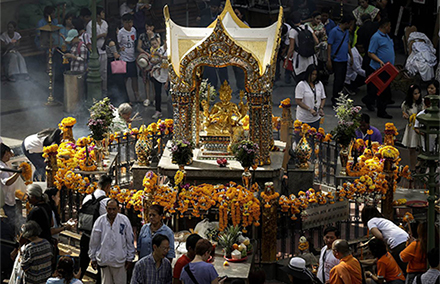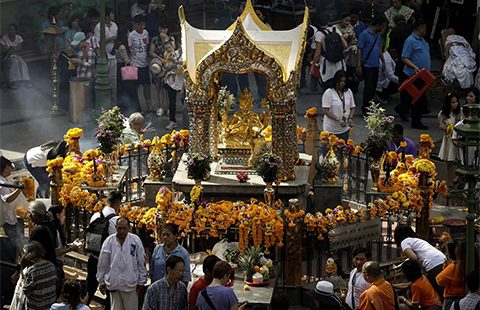
A multi-faith ceremony commemorates the victims of the Bangkok blast. Photo: Ritchie B Tongo/EPA.
There will be grim consequences if the Bangkok blast proves to have its origin in domestic politics.
Recent posts for New Mandala by Zachary Abuza and Lee Jones have accurately highlighted the obvious weaknesses in the Thai authorities’ investigation of the lethal bombing at the Erawan Shrine on 17 August.
Perhaps it should also be said, though, that few governments emerge from terrorist attacks looking good. Every terrorist attack represents an intelligence failure, and security agencies’ post-attack responses are often characterised by confusion and lack of coordination.
There has been much speculation about the identity of the terrorists who carried out the attack.
For Thailand’s military government and ordinary Thai people, the most worrying possibility is that the 17 August attack signalled a dramatic escalation of domestic political violence, whether the conflict in the Thailand’s far south, or the long-running fight for control of the national government. Many hundreds of Thais have lost their lives in these bitter conflicts since the 1970s.
In the south, ethnic-Malay insurgents routinely murder not only military and police personnel, but also schoolteachers, Buddhist monks and other civilians, and make frequent use of IEDs. On their part, the security forces have sometimes in the past, particularly under the Thaksin Shinawatra administration, reacted with excessive brutality to the insurgency.
However, although there have been signs of an expansion of the insurgents’ target-list to include tourist zones in the south, the southern conflict has until now been almost entirely contained within several provinces.
If southern terrorists were responsible for the 17 August attack – perhaps in retaliation for the military government’s hard-line towards peace negotiations – this would represent a serious expansion of an already vicious but contained conflict, with serious implications for international confidence in Thailand’s internal security.
Meanwhile, the central political conflict has seen large numbers of people from all sides lose their lives: students and left-wingers during the 1970s, students again in 1992, Red Shirts and soldiers in 2010, and Yellow Shirt protesters in 2013-14. However, the conflict has previously not involved any serious efforts to inflict large-scale casualties on civilians through terrorist attacks.
But while the military regime led by General Prayuth Chan-ocha has imposed superficial calm since the armed forces took power through their May 2014 coup, tensions have grown beneath the surface.
These tensions reflect not only a sense of disenfranchisement among the majority of the population whose political agency grew under the 1997 Constitution and the successive governments led or backed by Thaksin.
Most Thais recognise that, like it or not, the country’s present twilight era is likely to end soon. A struggle for power and wealth within Thailand’s conservative establishment may be imminent.
The nightmare scenario for Thailand would be outright violence between the country’s domestic factions, with ordinary people caught in the middle. The 17 August attack might provide a worrying portent of such violence.
However, despite sometimes contradictory and confusing statements from the Thai authorities, the circumstantial evidence that has emerged since the brutal and cowardly attack on the Erawan shrine suggests that it was more probably a manifestation of international terrorism than of domestic politics.
Under any government, Thailand, with its easy visa-free or visa-on-arrival access for many nationalities, its cosmopolitan environment, widespread corruption, pervasive organised crime, weak law-enforcement, patchy record of international cooperation on counter-terrorism, and plethora of sites popular with tourists, would be vulnerable to violent extremists from outside the country.
While in the past there doesn’t seem to have been a clear rationale for Islamist or other extremist groups to attack Thailand, Anthony Davies has argued quite persuasively that the Turkish nationalist-fascist group, the Grey Wolves,
may have perpetrated the bombing in retaliation for the Thai government’s forced repatriation of Uighur refugees to China.
If Thailand was a victim of international terrorism, this will pose serious challenges for the military government in Bangkok. To prevent future attacks, and to restore already sagging confidence in the country’s tourist sector, Thailand will need to improve its counter-terrorist capabilities, including in terms of intelligence collection and analysis. It will particularly need to intensify intelligence exchanges with the US, Australia, and other Western countries as well as Asian partners.
Indonesia’s acceptance of international support for its counter-terrorism effort following the 2002 Bali attack provides an example example of how such assistance can significantly bolster national capabilities. A bonus for Thailand and its international interlocutors would be expanded interaction on practical matters despite the tensions precipitated by Western governments’ reaction to the 2014 coup.
Overall, if the 17 August attack originated outside the country, there are grounds for an optimistic prognosis. With international assistance, the culprits may be tracked down. Enhanced counter-measures including tightened border controls and strengthened intelligence exchanges with regional and international partners could go a long way towards preventing similar attacks in future.
The outlook would be much grimmer if the attack was found to have domestic origins.
John Franklin is the nom de plume of a security analyst based in Southeast Asia. He has worked in the region since the 1980s.
 Facebook
Facebook  Twitter
Twitter  Soundcloud
Soundcloud  Youtube
Youtube  Rss
Rss 